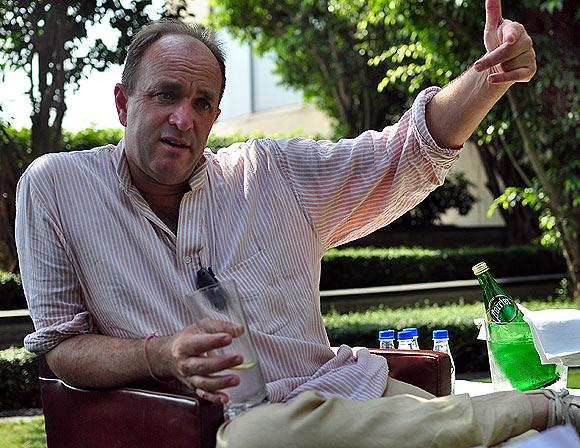
'If you can come with some arrangement with the Pakistanis that Pakistan ceases to stop creating trouble in Kashmir in return for the Indians not arming Afghanistan, everyone wins.'
William Dalrymple discusses his new book Return of a King, Afghanistan, the Mughals and, of course, India with Rediff.com's Syed Firdaus Ashraf.
If you don't like history, please pick up any book by William Dalrymple and find yourself falling in love with the subject.
Be it the White Mughals or The Last Mughal, Dalrymple beautifully brings the past to the present, making distant historical figures a part of your life; at times making them linger on in your mind long after you have finished reading the book.
He did this expertly with the last Mughal emperor, Bahadur Shah Zafar, and also with Khair-un-Nissa, the Hyderabad noblewoman in the White Mughals.
Dalrymple's new book Return of a King is the story of Shah Shuja, Afghanistan's puppet king from 1839 to 1842, who ruled his country with British help.
Shuja was ousted by the Gilzai tribe led by Akbar Khan, King Dost Mohammad Khan's son. This ultimately resulted in the First Anglo-Afghan war.
"The First Anglo-Afghan War was the biggest imperial disaster in the history of the 19th century. The legend is 18,000 British troops marched in and only one man came out alive. It's a fantastic story," says Dalrymple.
In an extensive interview to Rediff.com's Syed Firdaus Ashraf in Mumbai, Dalrymple speaks about the uncanny resemblance between the current situation in Afghanistan with what occurred almost two centuries earlier.
Drawing parallels with Afghanistan President Hamid Karzai, who hails from the same tribe as Shah Shuja, whereas Taliban soldiers fighting Western troops too come from the same tribe (Gilzai) that defeated the British in 1839.
Part I of a very interesting conversation with one of the most exciting writers in recent times.
After The Last Mughal you wrote Nine Lives, which had a contemporary theme. Now you return to history, this time to the Afghans with Return of a King.
What made you choose this subject?
The First Afghan War was the biggest imperial disaster war in the history of the 19th century. The legend is 18,000 British troops marched in and only one man came out alive. It is like the lost legions of Rome. It's a fantastic story.
After The Last Mughal and while doing Nine Lives, I was reading considerably about Afghan history. The more I read, I realised it is more of a current story. There were remarkable characters of that time and I knew that this would work for a book.
On my first trip to Afghanistan, I discovered and had read nowhere that Shah Shuja was from a tiny sub-tribe -- Durrani of the Popalzai tribe. Hamid Karzai (the current president of Afghanistan) is from the same tribe.
We (the Western countries) put the same guys back in twice. Likewise, Shah Shuja was brought down by the Gilzai tribe who occupy the passes between Kabul and Jalalabad. Today these guys make foot soldiers of the Taliban.
The more I travelled to Afghanistan, there were more similarities and parallels being played out in some uncanny way.
Please click NEXT to read this fascinating interview...
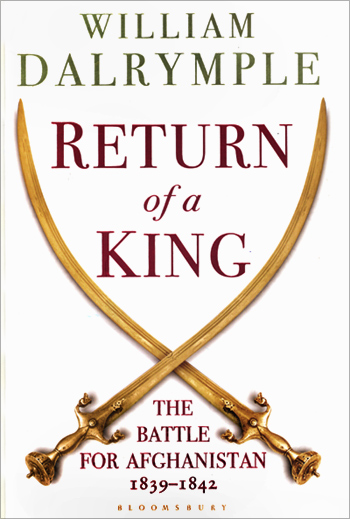
How did the British fall for the Great Game theory, fearing that Russians were going to take over Afghanistan and then India if they did not move in first?
Why was it so essential for them to start the First Afghan War in 1839?
It was not essential. It was a huge folly. The whole thing was completely unnecessary. The background was set 150 years ago.
The British had started encroaching the Indian coast by seizing Calcutta and were expanding slowly in India up till Ludhiana in the 1830s.
At the same time, the Russian army had conquered great swathes in Persia and the Ottoman empire.
They were advancing in Central Asia with great speed like the British in India had done in decades. Anyone looking at the map then was certain that these two empires were going to clash somewhere in the Hindu Kush or the Himalayas.
You didn't have to be a prophet to predict that. This was high likelihood. So, you get British hawks advocating pre-emptive attacks to seize the Hindu Kush before the Russians.
They feared if the Russians captured Afghanistan before them they would come swooping down and then take India too with them.
Actually, the British did not need to take Afghanistan because the then ruler of Afghanistan, Dost Mohammad Khan was pro-British.
It was only in treaty though. (Like it happened) exactly in the Iraq War, where you saw a small group of hawks manipulating their intelligence and using their prejudice to create the threat which did not exist like the weapons of mass destruction and Yellowcake.
We now know America had no reason to go to war with Iraq because they were no way connected and had nothing to do with 9/11 because they were not developing nuclear and chemical weapons.
Yellowcake was nonsense!
The British in the 1830s convinced themselves that the Russians might seize Afghanistan and a small group of hawks drove this extraordinary invasion with a huge army looping its way through the passes of Baluchistan, Kandahar and displacing one king (Dost Mohammad Khan) and putting in a puppet ruler (Shah Shuja).
They went in with 20,000 camels carrying all sorts of things like wines for officers, shoes, cigars, potted fish, jams. It was a ludicrous Victorian expedition and totally unnecessary.
When this was going on, there was a famine in Uttar Pradesh and thousands of people were dying of starvation, and they spent the money on the invasion rather than doing relief work in Agra. A fantastic tale of hubris!
Please click NEXT to read this fascinating interview...
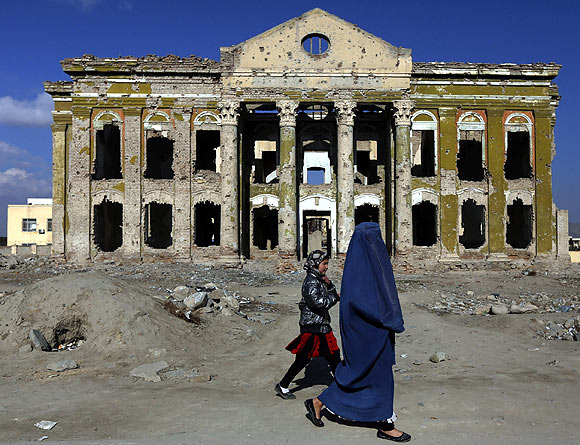
If you compare the history of that period and Afghanistan today, it is the same situation. In your opinion, what should the ISAF (International Security Assistance Force) do in Afghanistan?
One of the lessons you learn is that if you are a foreign army, don't invade Afghanistan (laughs). It is more of an economic reason than a military one. They are remarkable fighters.
The reason everyone's hands gets burned is economics because if you invade Iraq, you can pay back your troops because there is oil that you will own.
Afghanistan is only about stones and poverty and there is nothing to tax. So to put huge garrisons there makes no sense because you are not going to get anything in return.
History also shows that they don't like any foreigners or puppets ruling them. The rulers do much better when the foreigners go.
I think Karzai will do a much better job if the ISAF leaves Afghanistan next year. And that too if he keeps his nerve. The Americans are the problem, not the solution (in Afghanistan).
Don't you think the Taliban can return to power and that there will be a danger to the world from these jihadi elements? That the freedom of women will be suppressed?
I think it is extremely unlikely that the Taliban will roll over the country they way they did in the 1990s. A lot of things have changed since then.
The Tajiks and the Northern Alliance are strong and the Taliban is disunited and unpopular today.
The reality is that as long as the ISAF troops are in Afghanistan there will be resistance to them. And keeping the troops will not stop the Taliban from operating and resisting.
I firmly believe the ISAF troops must withdraw.
What should India do?
My personal view is that Afghanistan offers very little to India other than a negotiating lever with Pakistan.
Pakistan is obsessed with the idea of about a billion Indians surrounding them to the south and the east; and then having them behind too is a nightmare for the Pakistanis.
If India is wise, then they should trade with Pakistan on something more that matters to them like Kashmir.
If you can come with some arrangement with the Pakistanis that Pakistan ceases to stop creating trouble in Kashmir in return for the Indians not arming (Afghanistan) and that seems to be (the case). Everyone wins. (laughs).
Please click NEXT to read this fascinating interview...
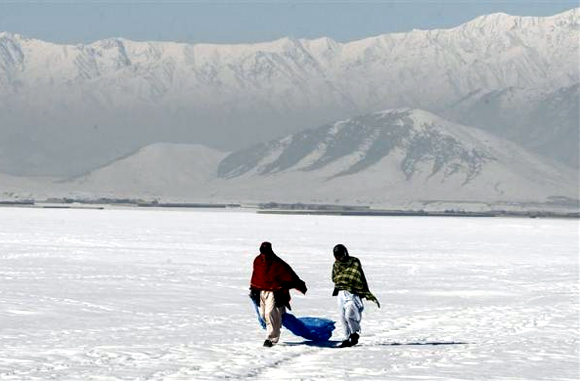
Historically India has been a friend of Afghanistan, so why should India move out of Afghanistan?
India has always been a friend of Afghanistan and the Afghans are very keen for India to help and want to increase military aid.
My personal view is that if India does that and starts giving direct military aid to Afghanistan then there is a huge danger that they can get sucked into a conflict which they don't need.
And it will make some error just like the Americans and British have got into.
The much wiser thing would be to do the Chinese approach -- to buy the mineral rights and build the railways (laughs) for a business relationship. This is, however, not the subject of my book. It is about 19th century history.
If you read the history of Afghanistan peace has not existed in that country for the last 200 years. At most, there are 30, 40 years of peace; then anarchy spreads.
If outsiders are not killing them, then they start killing within their families for possession of the kingdom.
That has been everywhere. If you see India's history, India too has different ethnicities of people and warriors, but that does not mean that if they fought in the past, then in the future too they will.
India has miraculously formed this great democratic union which is largely at peace for the last 60 years. There are small northeastern areas and Kashmir which see conflict, but miraculously there has been peace and progress for the last 60 years. That is what Afghans want too.
They don't want their children to get massacred by violence and disappear. They want them to be educated and make a living. There is no inherent reason that Afghanistan should remain the centre of conflict. These things can be resolved.
Look at my own people: The Scotts fought the English for 1,000 years before we finally formed the union in the 18th century. The Europeans fought for 500 years, destroying each other; they have now formed the European Union.
Conflicts can be resolved, it is not impossible.
Are you hopeful that Afghanistan will be a stable country in the future, ruled by Afghans, without any interference from outsiders?
I think there is reason to believe that things could improve. I am not hugely optimistic.
I don't believe Afghanistan necessarily is forever destined to be a place of conflict and a peaceful future is impossible. No, I don't think so.
Please click NEXT to read this fascinating interview...
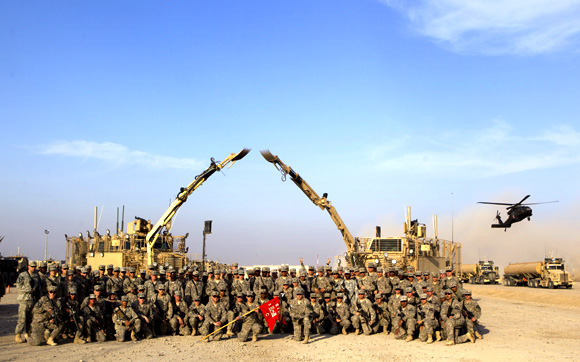
Why do you think the Afghan ruler Dost Mohammad Khan did not support Bahadur Shah Zafar in the war of 1857?
A century earlier Shah Waliullah, the Mughal emperor, had written to the Afghan ruler Ahmed Shah Abdali to save Delhi from the Marathas, which he did.
Why did Dost Mohammad not do the same in 1857, though the British and Dost Mohammad fought the first Afghan War against each other?
Dost Mohammad Khan was reinstalled on his throne by the British in 1842. The British, unusually, took a very wise decision. They would allow their enemy to retire in Mussoorie and helped him later to rule Afghanistan.
They also made an agreement that he would keep his peace with the East India Company after his release.
Dost Mohammad Khan kept his word and he didn't rise up in 1857. Whether that was right or wrong can be debated, but Indian nationalists will say he should have supported Bahadur Shah Zafar. But he didn't.
I think it was a very wise move by the British to send him back. A surprisingly, far sighted, move. After all, the massacre, war and all the defeats -- you can imagine how the press might have reacted to that -- but they sent him back. This was something remarkable.
Dost Mohammad Khan used the reforms to create the modern state of Afghanistan and by the end of his rule he had captured Herat. The boundaries of Afghanistan today are more or less the same as it was in Dost Mohammad Khan's time.
Why did the British want Dost Mohammad Khan out? Why did they reinstall Shah Shuja on the throne in Afghanistan?
This is what the first 100 pages of Return of a King explain. It was entirely unnecessary.
Alexander Burnes, the British emissary, reported from the ground that Dost Mohammad Khan was pro-British, he wanted an agreement with the (East India) Company.
My view, which I expressed in the book, (was that) it was a whole series of internal jealousies among the British. Burnes was young, good looking and a friend of the king, and senior bureaucrats resented his popularity, success and fame.
They rejected his advice on the ground that he was this young guy who knew nothing. We know how bureaucracy works, these sort of jealousies happen.
Likewise, you see power falling into the hands of the hawks, just like it happened after 9/11 in America with the George W Bush administration.
They manipulate their way and force their views. I think the invasion of Iraq (in 2003) and Afghanistan in 1839 had very strong parallels.
The way you get a dodgy dossier. The way intelligence is manipulated. These are interesting warnings for our times.
Please click NEXT to read this fascinating interview...

In The Last Mughal, you have mentioned specifically how the Mughals were tolerant rulers and how Bahadur Shah Zafar himself was tolerant towards Hinduism.
Some feel this is not what the Mughals were. They were invaders and destroyed temples in India.
It is like this bottle -- whether you see this half empty or half full? The reality is that certainly, the early Sultanates did destroy temples, the massive destruction of Nalanda university; unquestionably massive destruction took place in the early 13th century by the Turkic invasion.
Equally it is true that Aurangzeb destroyed several temples. But then you can look at the other side. You can see Akbar giving his army to the ruler of Jaipur. Akbar becoming a vegetarian and having these great inter-religious discussions.
How these composite cultures are formed. This seems to be the major story of medieval India. How these incoming Turkic sultans find themselves indigenous within a year.
Almost everything we value about North Indian culture -- the food, forms of music, forms of language -- comes from the meeting of indigenous Indian tradition and traditions of the Middle East and Central Asia which were brought in.
When you sit down and have kababs and bowl of daal. You find one half coming from India and one half from the Middle East.
When you listen to the sitar, you are hearing a form of music which comes from the meeting of two different worlds.
When you speak Hindi or Hindustani Urdu, words come from both backgrounds.
Any fair history of medieval India has to acknowledge that this huge amount of destruction took place, but equally there is a composite culture that developed.
Particularly the later Mughals, there are late Mughal paintings showing Muhammad Shah Rangeela playing Holi and celebrating Hindu festivals. Bahadur Shah Zafar used to visit Hindu temples.
This is a fact. These things happened. These are not the imagination of a novelist, but historical realities. But you have to bear both things in mind. The destruction took place, a composite culture grew and many Mughal emperors were extremely tolerant and engaged in Hindu practices.
You have to find a way to get all those three sides into your narrative. You will find people on either side. Extreme Nehruvian liberals who will deny and constantly downplay the degree of the destruction of temples and you have to find a narrative that embraces them both.
Don't miss part II of the interview next week!